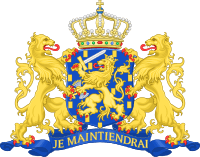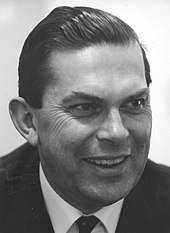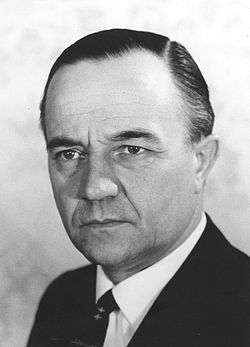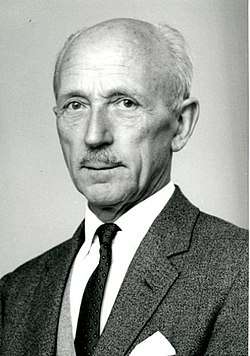Cals cabinet
The Cals cabinet was the cabinet of the Netherlands from 14 April 1965 until 22 November 1966. The cabinet was formed by the political parties Catholic People's Party (KVP), Labour Party (PvdA) and the Anti-Revolutionary Party (ARP) after the resignation of the Marijnen cabinet on 27 February 1965. The centre-left cabinet was a majority cabinet in the House of Representatives. Jo Cals of the Catholic People's Party was Prime Minister, with Anne Vondeling the Leader of the Labour Party and Barend Biesheuvel the Leader of the Anti-Revolutionary Party serving as Deputy Prime Ministers.[1]
| Cals cabinet | |
|---|---|
50th Cabinet of the Netherlands | |
  The installation of the Cals cabinet on 14 April 1965 | |
| Date formed | 14 April 1965 |
| Date dissolved | 22 November 1966 (Demissionary from 14 October 1966) |
| People and organisations | |
| Head of state | Queen Juliana |
| Head of government | Jo Cals |
| Deputy head of government | Anne Vondeling Barend Biesheuvel |
| No. of ministers | 14 |
| Total no. of members | 15 |
| Member party | Catholic People's Party (KVP) Labour Party (PvdA) Anti-Revolutionary Party (ARP) |
| Status in legislature | Centre-left Majority government |
| Opposition party | People's Party for Freedom and Democracy |
| Opposition leader | Molly Geertsema (1965–1966) Edzo Toxopeus (1966) |
| History | |
| Legislature term(s) | 1963–1967 |
| Incoming formation | 1965 formation |
| Outgoing formation | 1966 formation |
| Predecessor | Marijnen cabinet |
| Successor | Zijlstra cabinet |
 |
|---|
| This article is part of a series on the politics and government of Netherlands |
|
|
Local government
|
|
Related topics |
Formation
After the fall of the Marijnen cabinet, the confessional parties did not want snap elections because those could centre on the introduction of commercial television, the issue that led to the fall of the former cabinet. So a new cabinet was formed on the basis of the existing situation. A continuation of the Marijnen cabinet was considered to have too narrow a basis, so PvdA was asked to join in. As a result, CHU stepped out. But previous frictions between PvdA and KVP were overcome because there was a desire to form a cabinet fast, which was indeed done, in just over a month.
Term
After two decades of economic growth, this cabinet experienced a slight recession. Plans to build sports halls, roads and houses had to be tempered. In Limburg the coal mines were closed and plans were drawn to educate and re-employ the former miners.
There was also social unrest ('the sixties'), which became apparent in the Provo movement, construction worker protests, riots over the marriage of princess Beatrix in Amsterdam and the rise of new parties like Farmers' Party (BP), Pacifist Socialist Party (PSP), Reformed Political League (GPV) and the Democrats 66 (D'66). Especially the last party wanted to change the political order .
On 14 October 1966 Norbert Schmelzer the Leader of the Catholic People's Party and Parliamentary leader of the Catholic People's Party in the House of Representatives proposed a Motion of no confidence against the cabinet and Prime Minister Jo Cals. A shocking and surprised action in Dutch politics, it marked the first time that a motion of no confidence was proposed against a cabinet of the same party. The cabinet resigned that evening.[2][3][4]
Changes
On 5 February 1966 State Secretary for Defense for Air Force Affairs Jan Borghouts (KVP) died following a debilitating disease at the age of 55. On 22 June 1966 former Chairman of the United Defence Staff lieutenant general Heije Schaper, who until then had been working as Chief Adjutant in extraordinary service to Queen Juliana was installed as his successor.
On 31 August 1966 Minister of the Interior Jan Smallenbroek (ARP) resigned after he was involved in a traffic incident while driving under the influence. Minister of Justice Ivo Samkalden (PvdA) served as acting Minister of the Interior until 5 September 1966 when Koos Verdam (ARP), who until then had been working as a professor of Roman and International Private Law at the VU University Amsterdam was appointed as his successor.

Cabinet Members
| Ministers | Title/Ministry | Term of office | Party | |||
|---|---|---|---|---|---|---|
 |
Jo Cals (1914–1971) |
Prime Minister | General Affairs | 14 April 1965 – 22 November 1966 |
Catholic People's Party | |
.jpg) |
Dr. Anne Vondeling (1916–1979) |
Deputy Prime Minister / Minister |
Finance | 14 April 1965 – 22 November 1966 |
Labour Party | |
 |
Barend Biesheuvel (1920–2001) |
Deputy Prime Minister / Minister |
Agriculture and Fisheries |
24 July 1963 – 5 April 1967 [Retained] |
Anti-Revolutionary Party | |
 |
Jan Smallenbroek (1909–1974) |
Minister | Interior | 14 April 1965 – 31 August 1966 [Res] |
Anti-Revolutionary Party | |
.jpg) |
Dr. Ivo Samkalden (1912–1995) |
31 August 1966 – 5 September 1966 [Ad interim] |
Labour Party | |||
 |
Dr. Koos Verdam (1915–1998) |
5 September 1966 – 5 April 1967 |
Anti-Revolutionary Party | |||
.jpg) |
Dr. Joseph Luns (1911–2002) |
Minister | Foreign Affairs | 13 October 1956 – 6 July 1971 [Retained] |
Catholic People's Party | |
.jpg) |
Dr. Ivo Samkalden (1912–1995) |
Minister | Justice | 14 April 1965 – 22 November 1966 |
Labour Party | |
.jpg) |
Joop den Uyl (1919–1987) |
Minister | Economic Affairs | 14 April 1965 – 22 November 1966 |
Labour Party | |
 |
Piet de Jong (1915–2016) |
Minister | Defence | 24 July 1963 – 5 April 1967 [Retained] |
Catholic People's Party | |
.jpg) |
Dr. Gerard Veldkamp (1921–1990) |
Minister | Social Affairs and Health |
17 July 1961 – 5 April 1967 [Retained] |
Catholic People's Party | |
.jpg) |
Dr. Isaäc Arend Diepenhorst (1916–2004) |
Minister | Education and Sciences |
14 April 1965 – 5 April 1967 |
Anti-Revolutionary Party | |
.jpg) |
Ko Suurhoff (1905–1967) |
Minister | Transport and Water Management |
14 April 1965 – 1 May 1966 [Note] |
Labour Party | |
.jpg) |
Pieter Bogaers (1924–2008) |
1 May 1966 – 30 June 1966 [Ad interim] |
Catholic People's Party | |||
.jpg) |
Ko Suurhoff (1905–1967) |
30 June 1966 – 22 November 1966 |
Labour Party | |||
.jpg) |
Pieter Bogaers (1924–2008) |
Minister | Housing and Spatial Planning |
24 July 1963 – 22 November 1966 [Retained] |
Catholic People's Party | |
.jpg) |
Maarten Vrolijk (1919–1994) |
Minister | Culture, Recreation and Social Work |
14 April 1965 – 22 November 1966 |
Labour Party | |
| Ministers without portfolio | Title/Portfolio/Ministry | Term of office | Party | |||
 |
Barend Biesheuvel (1920–2001) |
Minister | Suriname and Netherlands Antilles Affairs (within Interior) |
24 July 1963 – 5 April 1967 [Retained] |
Anti-Revolutionary Party | |
.jpg) |
Theo Bot (1911–1984) |
Minister | Aid to Developing Countries (within Foreign Affairs) |
14 April 1965 – 5 April 1967 |
Catholic People's Party | |
| State Secretaries | Title/Portfolio/Ministry | Term of office | Party | |||
.jpg) |
Theo Westerhout (1922–1987) |
State Secretary | • Central Government Affairs • Provincial Government Affairs • Local Government Affairs (within Interior) |
12 July 1965 – 22 November 1966 |
Labour Party | |
.jpg) |
Leo de Block (1904–1988) |
State Secretary | • European Affairs • NATO Affairs • Benelux Affairs • International Aviation Policy (within Foreign Affairs) |
3 September 1963 – 5 April 1967 [Retained] |
Catholic People's Party | |
.jpg) |
Max van der Stoel (1924–2011) |
• United Nations Affairs • International Cooperation (within Foreign Affairs) |
22 July 1965 – 22 November 1966 |
Labour Party | ||
.jpg) |
Dr. Wiel Hoefnagels (1929–1978) |
State Secretary | • Fiscal Affairs • Tax and Customs Administration (within Finance) |
31 May 1965 – 22 November 1966 |
Catholic People's Party | |
 |
Joop Bakker (1921–2003) |
State Secretary | • Small Business Policy • Retail Policy • Competition Policy • Regional Development (within Economic Affairs) |
3 September 1963 – 22 November 1966 [Retained] |
Anti-Revolutionary Party | |
.jpg) |
Lieutenant Gerard Peijnenburg (1919–2000) |
State Secretary | • Army (within Defence) |
13 May 1965 – 5 April 1967 |
Independent Christian Democrat (Catholic) | |
 |
Vice admiral Adri van Es (1913–1994) |
• Navy (within Defence) |
14 August 1963 – 16 September 1972 [Retained] |
Anti-Revolutionary Party | ||
 |
Colonel Jan Borghouts (1910–1966) |
• Air Force (within Defence) |
12 July 1965 – 5 February 1966 [Died] |
Catholic People's Party | ||
 |
Lieutenant general Heije Schaper (1906–1996) |
22 June 1966 – 5 April 1967 |
Independent Liberal (Conservative Liberal) | |||
.jpg) |
Dr. José de Meijer (1915–2000) |
State Secretary | • Social Security • Unemployment Affairs • Occupational Safety • Social Services • Poverty Policy • Public Sector Organisations (within Social Affairs and Health) |
15 November 1963 – 5 April 1967 [Retained] |
Catholic People's Party | |
.jpg) |
Dr. Louis Bartels (1915–2002) |
State Secretary | • Elderly Policy • Disability Affairs • Veteran Affairs • Medical Ethics Policy (within Social Affairs and Health) |
3 September 1963 – 5 April 1967 [Retained] |
Catholic People's Party | |
.jpg) |
Hans Grosheide (born 1930) |
State Secretary | • Primary Education • Secondary Education • Higher Education • Special Education (within Education and Sciences) |
3 September 1963 – 6 July 1971 [Retained] |
Anti-Revolutionary Party | |
_Posthumus_(1970).jpg) |
Siep Posthumus (1910–1987) |
State Secretary | • Transport Infrastructure • Public Transport • Energy Policy • Postal Service • Weather Forecasting Service (within Transport and Water Management) |
4 May 1965 – 22 November 1966 |
Labour Party | |
.jpg) |
Cees Egas (1913–2001) |
State Secretary | • Youth Policy • Environmental Policy • Nature Policy • Media Affairs • Culture Policy • Arts Policy • Recreation Affairs • Sport (within Culture, Recreation and Social Work) |
10 May 1965 – 22 November 1966 |
Labour Party | |
| Source: (in Dutch) Rijksoverheid.nl | ||||||
- Retained Retained this position from the previous cabinet.
- Res Resigned.
- Ad interim Ad interim.
- Note Medical leave of absence.
- Died Died in office.
Living cabinet member
- As of 2020, the following cabinet members are still alive:
- State Secretary
- Hans Grosheide – 6 August 1930
- State Secretary
References
- ""Misschien waren we allebei teveel boekhouder'" (in Dutch). NRC Handelsblad. 12 September 1991. Retrieved 1 April 2018.
- (in Dutch) De Nacht van Schmelzer, Geschiedenis24, 15 October 2001
- (in Dutch) Kabinetscrisis 1966: de Nacht van Schmelzer, Parlement & Politiek, 24 December 2008
- (in Dutch) De Nacht van Schmelzer (1966), Histotheek.nl, 9 March 2010
External links
- Official
- (in Dutch) Kabinet-Cals Parlement & Politiek
- (in Dutch) Kabinet-Cals Rijksoverheid
| Wikimedia Commons has media related to Cabinet Cals. |